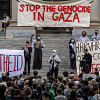Rohingya Crisis: China, Russia still unmoved at UNSC
UN Security Council members, except China and Russia, have called for robust council actions so that Myanmar addresses the root cause of the Rohingya crisis, grants the refugees citizenship and holds those who carried out atrocities against them accountable.
The Council must find a suitable solution to the issue for improving the situation on the ground. Otherwise, the crisis may constitute a threat to international peace and security, they warned.
The 15-member UNSC met on Monday to discuss a recent visit by its envoys to Bangladesh and Myanmar.
During the meeting, the members also said the international community must significantly increase humanitarian funding for the Rohingyas and take measures to prepare them for upcoming monsoon rains.
Besides, the Council must urgently respond to the needs of the refugees while also ensuring that the conditions for their voluntary, safe, dignified and sustainable return are created, they said.
The UNSC members added that they were struck by the plight of the Rohingya refugees in Bangladesh and widespread destruction of Rohingya villages in Rakhine State in Myanmar.
Recounting the haunting stories of the refugees they met, the members described mass rapes, attacks on children and the razing of entire villages, stressing that the visit had “awakened their collective conscience into robust and concerted action”.
Like in the past, Russia and China apparently sided with Myanmar and expressed hope that Bangladesh and Myanmar would resolve “relevant issues through bilateral dialogues”.
They said the international community should increase humanitarian assistance to the two countries and work towards improving conditions there.
The United States indirectly criticised China for shielding Myanmar from strong UNSC action over the military crackdown mainly against Rohingya Muslims, Reuters reported.
The US and other countries have denounced the crackdown as ethnic cleansing.
US Ambassador Nikki Haley did not mention China by name, but China had proposed substantial amendments to a British-drafted Security Council statement on Myanmar last week.
“Some members of the council have kept us from taking action for cynical and self-interested reasons,” Haley said.
“Some undermined the unity of the Council demonstrated during the trip with unhelpful edits that only weakened the council's message.
“The active involvement of the Security Council is essential to bring an end to the Rohingya crisis,” the US permanent representative said.
“We have unique tools to encourage Burma to take real step towards resolving the crisis, and we must use them,” she said, without specifying if she meant sanctions, reported AFP.
Haley said the Council should “move quickly to adopt a resolution”.
Speaking before Haley, China's UN Ambassador Ma Zhaoxu told the Security Council that Myanmar and Bangladesh should be encouraged to solve the crisis bilaterally to “make sure it doesn't drag on or become more complicated.”
“The council should continue to encourage Myanmar and Bangladesh to increase consultations and cooperation for the early implementation of the bilateral arrangement,” Zhaoxu said, according to Reuters.
Speaking after Haley, Russian Deputy UN Ambassador Dmitry Polyanskiy said the unity of the council on the issue was important and he hoped some members “will not fall prey to the temptations of using this situation to pursue their narrow, domestic political aims.”
Mansour Ayyadsh A. Alotaibi, PR of Kuwait, speaking in his capacity as one of three co-chairs -- along with the representatives of Peru and the United Kingdom -- of the Council's mission to Bangladesh and Myanmar from April 26-May 2, said it became clear that the conditions for the safe and dignified return of refugees to Myanmar had not yet been met.
Speaking in his national capacity, he agreed with the Working Group's findings regarding possible regional repercussions of the crisis. “Council members must act, as the crisis may constitute a threat to international peace and security,” he added.
Commenting on the sheer breadth of the devastating conditions, the UK's Permanent Representative (PR) Karen Pierce pointed out that the two existing reception centres could accommodate at best 300 refugees per day at a time when 900,000 refugees needed assistance.
She continued little progress was being made on tackling pressing political issues, including settling the citizenship status of Rohingyas.
PR of France Anne Gueguen said the international community must significantly increase humanitarian funding and take measures to prepare the refugees for the coming monsoon rains; support local actors to make living conditions as bearable as possible; and pay special attention to the needs of women and children who had suffered acts of violence.
However, she stressed that words and pledges from the government were not enough. Myanmar must commit to tackling the root causes of the crisis, including by implementing the recommendations of the Annan Commission Report, granting citizenship to the Rohingyas and holding those responsible for violence, and atrocities and other crimes to account.
The Netherlands envoy Lise Gregegoire said “the scale of the crisis cannot be denied by anyone.” Swift action was required to prepare the camps for the imminent possibility of floods, she said, lamenting that the outlook for a swift solution to the crisis remained bleak.
She called on the Myanmar authorities to allow full access to United Nations and humanitarian organisations.
“Without addressing the crimes against the Rohingyas, the decades-old cycle of violence and discrimination could not be broken,” she observed and called on Myanmar to allow access to the fact-finding mission, as well as the special rapporteur.
Joanna Wronecka of Poland, council president for May, spoke in her national capacity, saying the horrifying scale of conditions called for robust Council action.
Bangladesh's PR Masud Bin Momen reiterated that the government continued action to ensure the safe return of the Rohingyas and called for adoption of a Council resolution building on its 2017 presidential statement, prevailing on Myanmar to implement Advisory Commission recommendations and ensuring accountability and justice.
Raising several points for the Council to consider during its informal consultations, he said the safe return must be ensured. The Rohingya community needed answers to pressing questions of citizenship, freedom of movement, human rights and socioeconomic development.

 For all latest news, follow The Daily Star's Google News channel.
For all latest news, follow The Daily Star's Google News channel. 








Comments